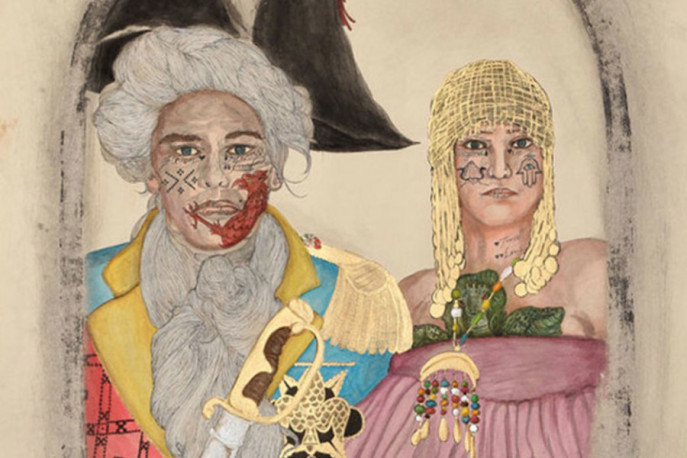
By Ellen C. Caldwell
for KCET Artbound
Through his drawings, monumental portraits, detailed maps, and sculptures, Los Angeles-based artist Frohawk Two Feathers is creating an ongoing saga of epic proportions. Rewriting history by mixing fact and fiction, Two Feathers has devoted much of his career to telling the tale of the imagined union of France in England through his ongoing exhibition installments of the “Frenglish” Empire.
Throughout his oeuvre, Two Feathers plays with our conception of time, history, and reality by repeatedly using historic events as a base, and tweaking them slightly by adding, subtracting, or substituting key players and figures. He uses photographs of his friends and colleagues as inspirations for his portraits of empire and gives them an antiquated feel by aging the surface of his paintings and sculptures with coffee, tea, and dirt. In this myriad of ways, he imbues the past with the present, as he plays with themes of Afrofuturism and the colonial imaginary. His work calls to mind visual time travel as he rebuilds and reimagines the past, creating an alternative rendition of history that is uniquely “midtopic” in the way that it is neither saccharinely and utopically perfect, nor dystopically doomed and foreboding in a Bradburian or Orwellian sense.
This blending of parallel histories in order to illuminate current climates occurs in other humanistic fields. Literature professor Rudyard J. Alcocer presents a theory about the popularity of time travel literature, which could be applied to Two Feathers’ work. In his book “Time Travel in the Latin American and Caribbean Imagination,” Alcocer analyzes time travel literature to determine whether there are similar socio-political climates and events that might have inspired this literature’s popularity at distinct times in both Latin America and the Caribbean. He posits that, “…if [fiction and nonfiction] seek either a literal or symbolic return to the past, both… do so because they want to change something that seems immutable without such an imaginative return to the past. The fictional missions that began a few decades ago with the objective of altering history in the Americas have become among some groups the actual missions to alter the present.”
